![]()
A month after Oceanographic Magazine showed off the outstanding finalists of its 2024 Ocean Photographer of the Year contest, the judges have selected the competition’s overall winners. All 10 winning photographers skillfully demonstrate the beauty and impact of underwater photography.
The overall winner and new “Ocean Photographer of the Year” is Rafael Fernández Caballero, having won for his incredible image of an underwater feeding frenzy.
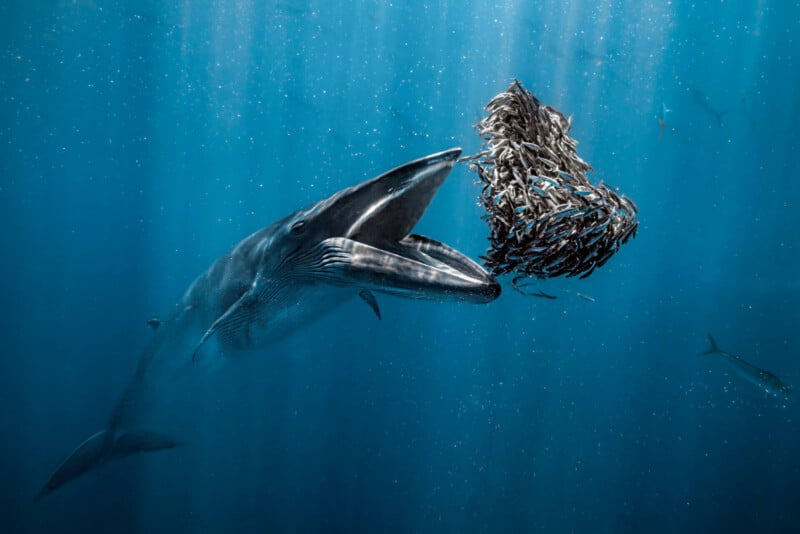
Caballero’s prize-winning photo, captured in Baja California, Mexico, shows a Bryde’s whale about to chow down on a bait ball of sardines, which amassed to feed on plankton. An entire food chain is captured in a single beautiful image.
“A feeding frenzy is the biggest show on Earth for me,” the photographer explains. “The smallest animals on Earth, plankton, attract bait balls of sardines and, in turn, giant whales show up.”
“I was lucky to witness this show off Baja California Sur at the end of 2023. Due to El Niño and warmer temperatures, different species joined the party and I witnessed huge numbers of beautifully colored dorados and large groups of sea lions that were attracted by bait balls. The highlight was this whale coming out of nowhere with its mouth wide open.”
Coincidentally, the winning image in the Wildlife Photographer of the Year category was also captured in Baja California Sur. Manuel Castellanos Raboso took top honors in the category for his image of a mahi-mahi, sometimes called a dolphinfish, amid a feeding frenzy.
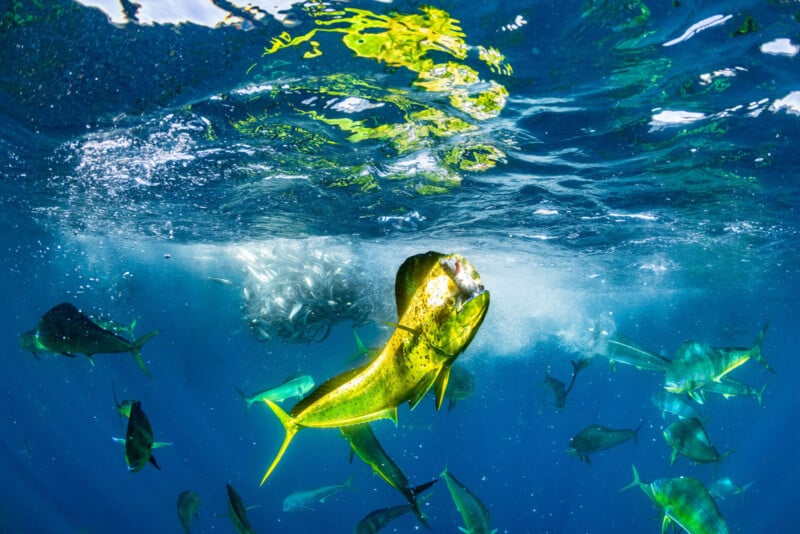
“Its vibrant yellow and green hues shimmer brilliantly under the refracted sunlight against the stunning blue of the Pacific Ocean,” says Raboso. “The bait ball was semi-static, allowing us to spend some time in the water with these fish, moving like torpedoes in front of us. This scene captures the essence of the hunt and the energy of Baja’s marine life, witnessed yearly in what has become one of my favorite places on Earth.”
Henley Spiers won the “Fine Art Photographer of the Year” title for their mesmerizing image of a mobula ray swimming in the waters of, you guessed it, Baja California Sur. It’s clearly a prime place for underwater photography.
“Born during the great mobula aggregations of spring, juvenile Munk’s devil rays remain in the Sea of Cortez long after their parents have left, using the shallow bays of Espiritu Santo Island as a nursery,” Spiers explains.
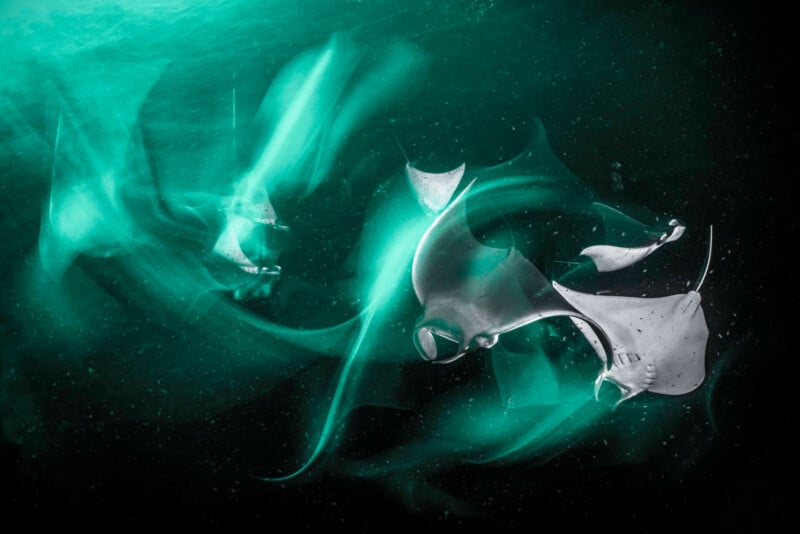
“By autumn, the water is clear, a bonus for underwater photography but also signifying less food for the filter feeding rays. At night we hung a green light from the back of our boat, as plankton gathered around it the mobula rays gratefully swooped in for a microscopic buffet. The rays seem to fly through the water as they pursue their dinner. Entranced by their grace, I used a two-second exposure to capture their movements which, to my eye, felt like an aquatic ballet.”
“Adventure Photographer of the Year” Tobias Friedrich moves the competition away from the coast of Mexico and to the Bahamas with a photo of a scuba diver swimming near a vast shipwreck.
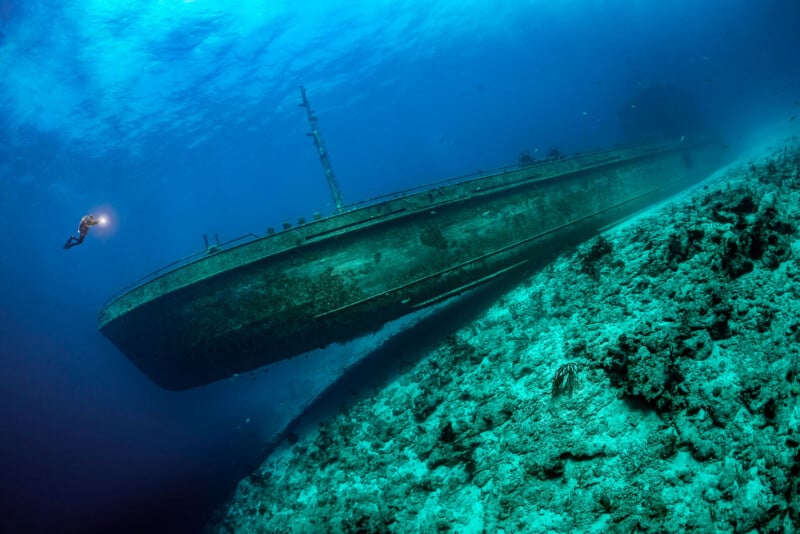
While Friedrich was on a trip to the Bahamas to take photos of tiger and hammerhead sharks, bad weather forced a change of plans. He and his fellow divers decided to explore a nearby shipwreck instead, and the decision has paid dividends.
“At that time, the sand under the bow was washed out which made it an excellent photographic opportunity,” he recalls.
Conservation is an integral part of nature photography, and the Ocean Photographer of the Year contest includes two dedicated conservation categories.
Frederik Brogaard’s image showing a fin whale waiting to be butchered in Iceland won the “Conservation (Impact) Photographer of the Year” category. Fin whales are the world’s second-largest species of whale, and the whale was to be butchered at a whale processing plant in Iceland before being sent to Japan.
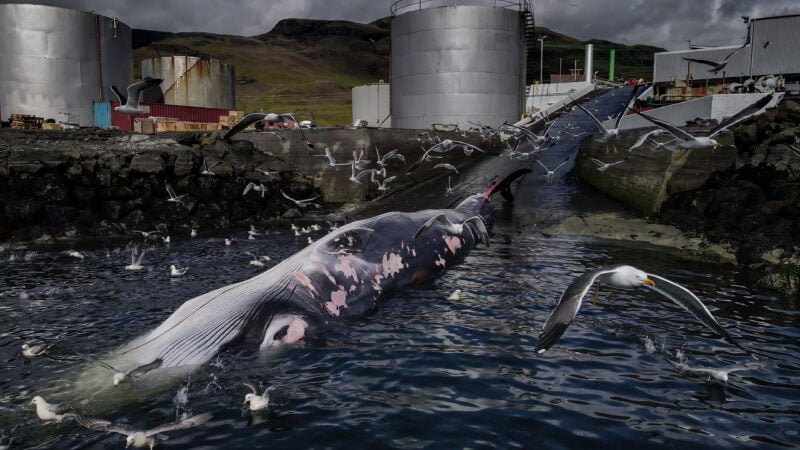
“Shortly after taking this image, the whale was hoisted up the ramp,” Brogaard says. “The picture might induce a feeling of hopelessness, but public uproar throughout the last two years has resulted in the cancellation of last year’s whaling season in Iceland.”
“Unfortunately, a whaling quota was again issued this year. I hope this picture raises awareness and serves as inspiration to keep the public pressure on. These whales are crucial in our fight against climate change, sequestering tons of CO2 in their lifetime, and are worth more to us alive than dead.”
On a more hopeful note, Shane Gross’ image of a green sea turtle being released by a researcher in Seychelles won the “Conservation (Hope) Photographer of the Year” prize.
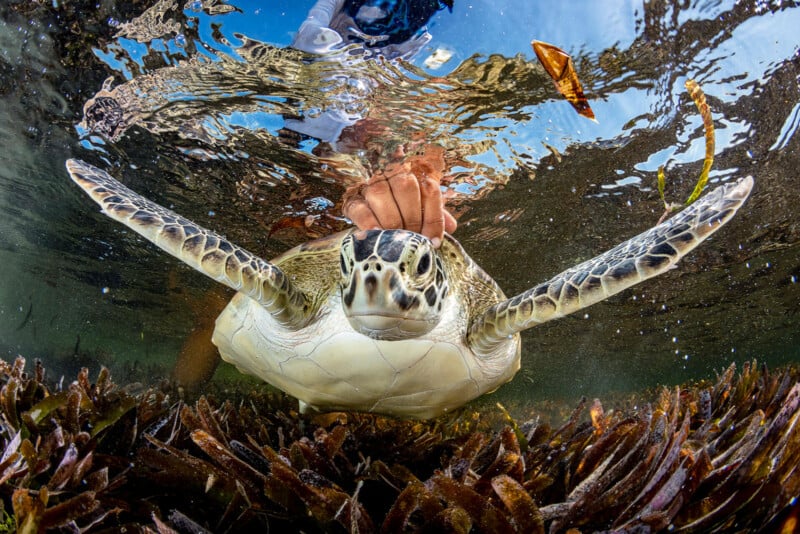
Another winning photo showing how people and the world’s oceans interact took top honors in the “Human Connection Award: People and Planet Ocean.” The winning image, captured by Zhang Xiang in Fujian, China, shows a traditional Chinese fisher walking across a Sun-soaked beach.
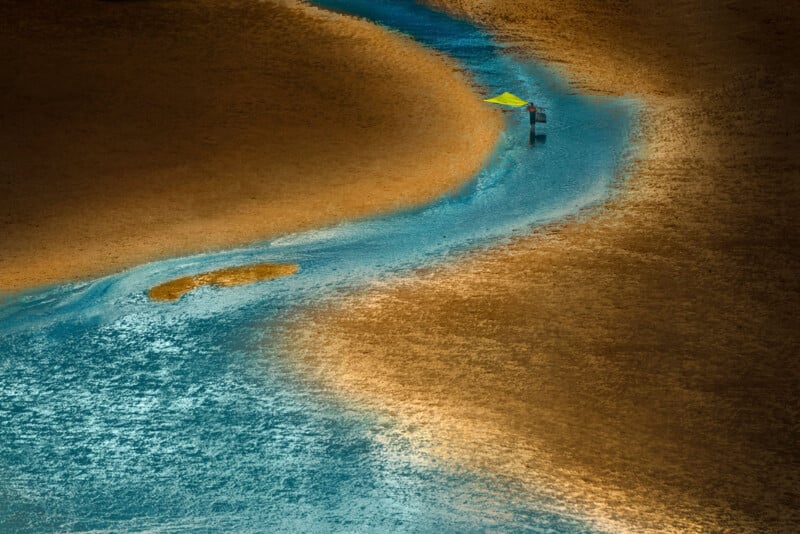
“The gorgeous sight attracts many tourists, bringing income to local people,” Xiang explains.
Jacob Guy is the 2024 “Young Photographer of the Year” thanks to his underwater shot of an elusive algae octopus in Indonesia.

“Normally coming out to hunt at dusk, with incredible camouflage, these creatures blend seamlessly into the reef — until they are viewed under a different light,” Guy says.
The young British photographer notes that the algae octopus is the only known cephalopod that fluoresces when exposed to ultraviolet light.
“On my last night dive of the trip, I got lucky and found one of these beautiful creatures on the hunt for a meal and managed to capture the intense look from its yellow eyes.”
Shane Gross won another category this year — the “Ocean Portfolio Award.” Gross’ collective portfolio, which can be viewed on Oceanographic‘s website in its entirety, features a diverse range of subjects, including little fish with egg sacs, a crocodile, sharks, an octopus, tadpoles, and so much more.
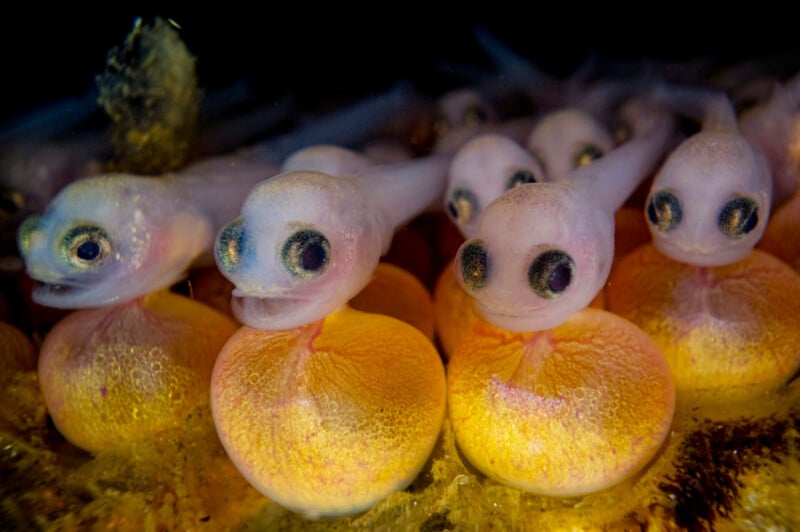
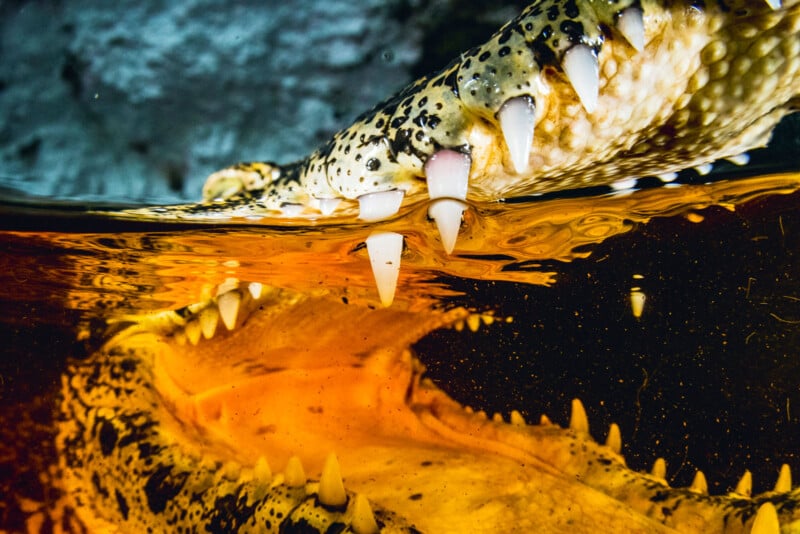
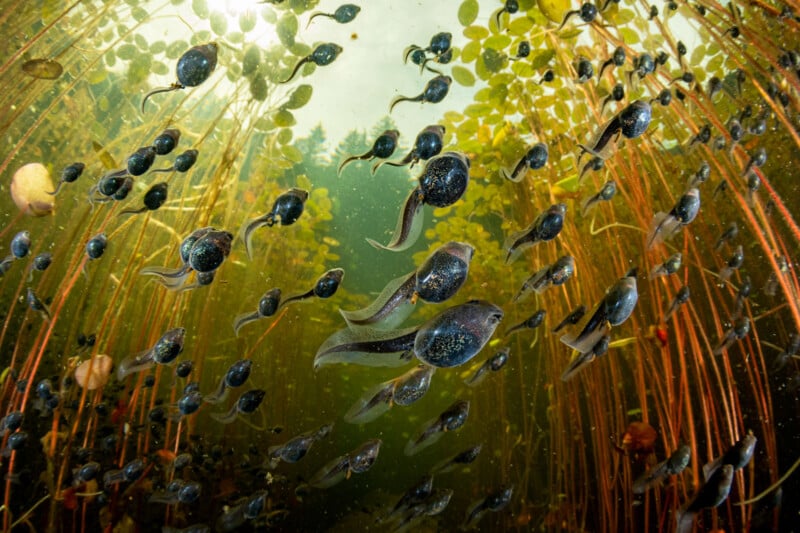
Rounding out this year’s award-winners is Ipah Uid Lynn, who won the “Female Fifty Fathoms Award” for her image of a whale shark surrounded by a school of fish.
“I shot this image during sunrise in shallow water and I used an underwater video light, as well as a colored light to highlight the whale shark and the fish against the dark background,” the photographer explains. “The composition emphasizes the scale and grace of the whale shark, and the image beautifully showcases the mesmerizing interplay between light, motion, and marine life.”
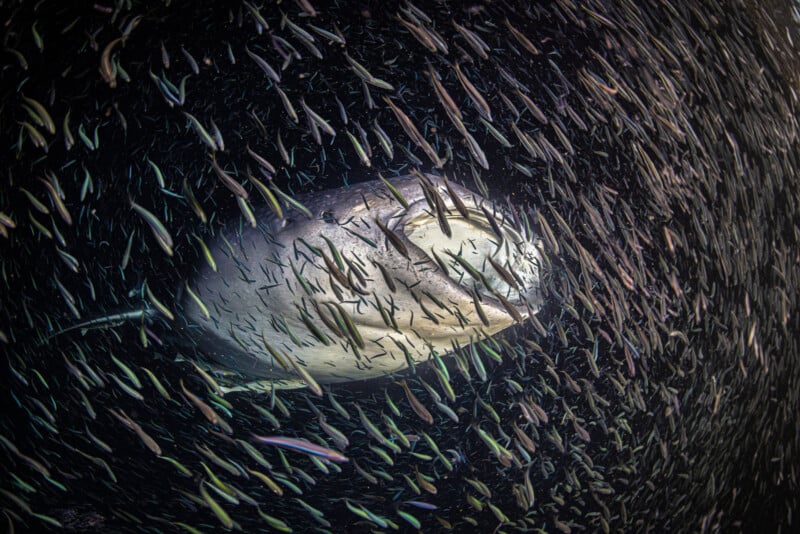
Beyond the winning photo above, another nine of Uid Lynn’s photos are featured on the Ocean Photographer of the Year website.
Alongside all the winning photographs featured above, second- and third-place winners were selected for most categories. These images, while they didn’t take top prizes, are excellent examples of underwater and ocean-based photography and well worth viewing on the Ocean Photographer of the Year website. All winning images will also be shown in an exhibition in Sydney, Australia, which opens on November 28th.
Image credits: Ocean Photographer of the Year 2024 / Oceanographic Magazine. All photographers are credited in the individual photo captions.
